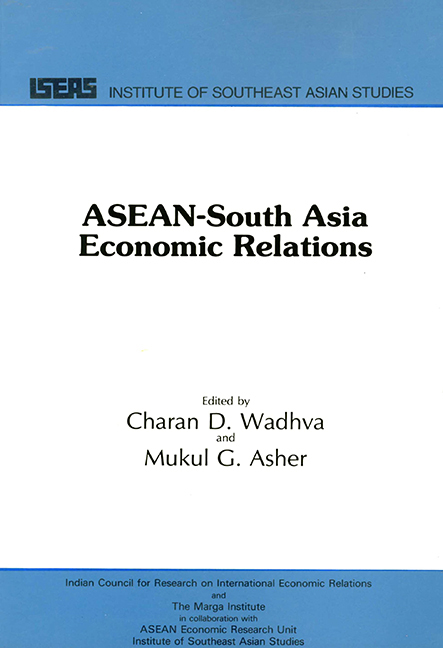Postscript
Published online by Cambridge University Press: 21 October 2015
Summary
Since this manuscript was completed around the middle of 1983, there have been several developments which have increased the urgency for enhancing economic relations between the countries of ASEAN and South Asia.
It has become increasingly clear that the industrial countries in general, and the United States and Japan in particular, will continue with their mercantilists and self-centred economic policies for some time to come. Therefore, neither ASEAN, in terms of access to markets and technology transfer, nor South Asia, in terms of access to markets and to concessional development finance, can expect much satisfaction from the industrial countries. This development, in conjunction with the continuing balance of trade, payments, and budget deficits in many of the ASEAN and the South Asian countries, has increased the urgency for these countries to expand their economic relations. Such relations can take the form of not only conventional trade but also barter trade, investment, technology transfer, and technical co-operation. Slower growth rates expected in the ASEAN region in the next decade, and the desire to expand agriculture and small-scale industry in several ASEAN countries, such as Indonesia, the Philippines, and to some extent Malaysia, provide new opportunities for technical co-operation with some of the South Asian countries, such as Pakistan and India. The Malaysian Prime Minister Datuk Sri Mahathir Mohamad's visit to Pakistan in March 1984, and the recent signing of the trade agreement between India and Thailand may be regarded as recognizing the need to expand economic relations. Malaysia has also increased its contacts with Bangladesh as a part of its effort to strengthen trade and investment links with the Islamic countries.
Since the completion of the manuscript, contacts among the South Asian Regional Co-operation (SARC) grouping have become more intensified, with the first summit of the heads of member countries scheduled to be held towards the end of 1985. The SARC countries appear to have realized that co-operative rather than conflictive relations among themselves are a precondition for improving their economic performance.
- Type
- Chapter
- Information
- ASEAN-South Asia Economic Relations , pp. 375 - 376Publisher: ISEAS–Yusof Ishak InstitutePrint publication year: 1985

